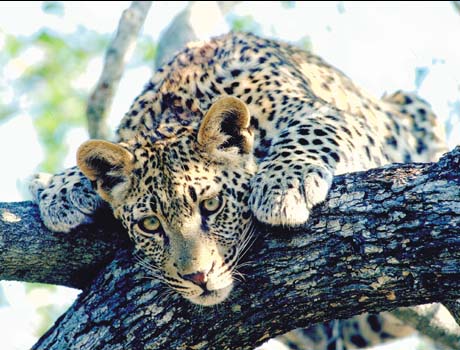Kruger National Park for pros: trailing trainee rangers
 Kruger National Park, South Africa - It's the night after a full moon on the northern edge of South Africa's Kruger National Park and the semi-darkness cloaking the camp is shot through with the sounds of animals munching.
Kruger National Park, South Africa - It's the night after a full moon on the northern edge of South Africa's Kruger National Park and the semi-darkness cloaking the camp is shot through with the sounds of animals munching.
Nyala berries - the fallen fruit of the gnarled grand dame of savanna trees are being gobbled up by three white-socked antelope of the same name as the tree.
High up in the canopy, a furrowed-browed baboon is facilitating the feast by dropping some of his own takings.
A crashing noise from the thicket heralds the arrival at the party of a pair of elephants.
A large male saunters past and stops in front of a hut to snack on a small fever-berry tree. Wrapping his trunk around a stem he wrenches it from the tree, splitting the wood to get at the nutritious inner cambium layer.
This is Kruger Park - but not as tourists know it. Few visitors make it to this unspoilt northernmost corner of South Africa's best- loved game reserve, where game roam unmolested by cavalcades of 4X4s and clicking cameras.
Which is why Ecotraining, a South African company that trains field guides in Africa and Australia and runs wildlife courses for amateurs, has set up camp here - deep in the bush near the border with Zimbabwe.
Buried under their blankets in their wood and canvas huts, some of the current class can be heard soundly snoring.
By dawn the following day, none are still napping. After four weeks in the wild, 15 members of the local Makuleke community are undergoing their level one examinations.
Rosina Makuleke, 41, pulls on her backpack for her practical assessment. The round-faced mother of two has to lead a one-and-a-half-hour guided bush walk.
Rosina is the eldest of the group of mostly twenty-somethings and one of the most promising candidates. She used to manage a shop in another part of Kruger Park but quit after the park outsourced the business to a private company, which, she says, denied her holidays.
"If I can pass my FGASA (Field Guides Association of Southern Africa) level one I can go anywhere," she says hopefully.
Although some of the students had never set foot in the bush before, and many had never seen a lion, the Makuleke are on home soil here.
The Shangaan-speaking community of around 2,500 families inhabited this part of Kruger Park before being ordered out at gunpoint by the apartheid government in 1969.
Rosina was only a toddler when her family was uprooted from its homestead beneath the baobabs and forced to begin a new life in a cramped village on the other side of the fence.
This part of the story has a happy ending. In the late 1990s the community successfully reclaimed all 24,000 hectares in the first major post-apartheid land restitution deal.
But instead of moving back into the park the Makuleke agreed to leave the land in situ and instead harness its tourism potential.
Ecotraining and two tourist lodges pay the Makuleke for the use of their land, with the added stipulation, in Ecotraining's case, that the company train 15 community members each year to become field guides.
The education clause was a master stroke. With little by way of state support available for students, most black South Africans find it impossible to pay for higher or further education. The month-long Ecotraining course costs between between 17,000 (around 2,100 dollars) and 21,000 rand (around 2,600 dollars).
"We only have a very small percentage of black South Africans attending our courses," the company confirms.
And yet, in remote rural areas like this, where most work as farm labourers, tourism offers the best job prospects - especially as South Africa girds itself for the arrival of hundreds of thousands of World Cup tourists next year.
Over the past month, Rosina and the group have been learning about their birthright from one of the country's top wildlife guides, Ecotraining's Bruce Lawson, and his three assistants.
Clad in khaki shirts, shorts and hats, with ammunition belts slung around their waists, Bruce and Ed, a young British guide, load their rifles and fall in behind her and three students posing as tourists.
At the edge of the camp, Rosina circles with a stick the round tracks left by last night's jumbo visitor.
As the group advances towards a dam, and a troop of grazing buffalo, Rosina's gaze alights on a termite mound. "It's like a caste system in there," she points out. "The king has his own rooms, and so do the soldiers and the workers. And when it gets hot they just make a hole on top and it's like an air conditioner!"
Rosina's rich store of knowledge, some of which was passed to her by her mother, makes her good guide material. But it's their communication skills that really give her and three young men, all of with some experience in tourism - the edge.
The remaining 11 fail - an unusually high rate for Ecotraining, which posts an average level-one pass rate of 78 per cent pass rate.
"The knowledge is there but because of a lack of communication skills and English, they can't get it across," Lawson says ruefully.
To those who fell short of the mark, he recommends trying out for "front of house" tourism jobs, such as bar work.
Leonard Makhubela says he plans to study more and reapply for the test, after being converted to conservation.
"Now," he says, "when I see people cutting trees for wood, I tell them they must stop because we need these trees to breathe." (dpa)